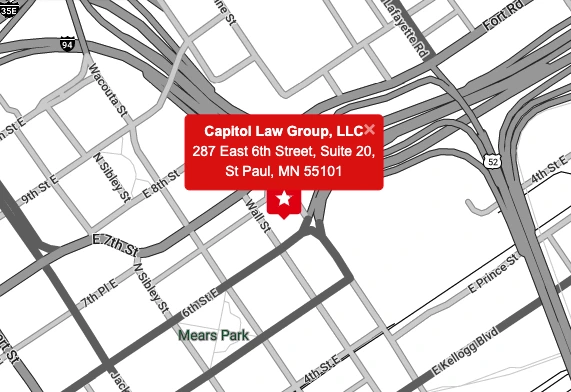Collateral Consequences of a MN Sex Crimes Conviction

Since the 1990s, most types of sex crimes incidents have decreased sharply. Experts confirm that the numbers have dropped because fewer offenses are being committed, not because there are fewer reports.
The 1990s was also the time that most states, including Minnesota, adopted sex offender registration requirements and imposed other collateral consequences on convicted persons. To most lawmakers and judges, the lower sex crime numbers prove that, while intrusive, these programs are effective. So, they are not going away anytime soon.
Sometimes, it’s possible to successfully challenge collateral sex crimes consequences using an Eighth Amendment “cruel and unusual punishment” argument. But instead of raging against the machine, most St. Paul criminal defense lawyers work within the system to bring about the best possible result under the circumstances.
Mandatory Sentencing Provisions
For the most part, courts closely scrutinize, and often overturn, mandatory minimum sentencing provisions. The harsh mandatory minimum drug crime penalties which Congress passed in the 1980s and California’s controversial “three-strikes law” spring immediately to mind. Arguably, such provisions punished defendants for their status (who they were) as opposed to their conduct (what they did).
First and second-degree Criminal Sexual Conduct, which are the most serious sex crimes in Minnesota, carry mandatory minimum sentences. These presumptive minimums are, respectively, 144 months and 90 months in prison. Additionally, a life sentence may be in order if the crime meets certain aggravating circumstances as outlined in the applicable Minnesota law.
Finally, most sex crimes sentences must include at least 30 percent of the maximum fine. A Ramsey County judge has some discretion to reduce the fine or allow installment payments.
All sex crime felonies include some other mandatory sentencing provisions as well. Some of the highlights (or lowlights) include:
- Conditional Release: If the defendant serves prison time, the defendant must be on parole (supervised release) for at least ten years. Certain CSC convicts may face lifetime supervised release.
- Treatment: In misdemeanor sex crimes cases, such as indecent exposure or making obscene phone calls, the defendant must submit to an evaluation and, if necessary, treatment for sexual dysfunction. If the defendant refuses to fully submit, the judge will put the defendant in prison.
- DNA Sample: In Minnesota, pretty much any defendant convicted of a violent or sexual felony must provide a DNA sample. If the defendant was convicted of such an offense in another state, the sample requirement may still apply.
Many of these add-ons are on shaky legal ground. For example, courts have upheld DNA swabs, but often have a problem with samples that are permanently stored in government facilities. Nevertheless, it’s hard for a St. Paul criminal defense lawyer to successfully challenge them. From both a practical and legal standpoints, convicted felons have fewer rights in court.
Finally, sex crimes are all crimes of moral turpitude. So, even if the defendant is charged with a misdemeanor and/or receives deferred adjudication, deportation is a strong possibility.
Registration Requirements: Lifetime or Term of Years
While these mandatory provisions are arguably excessive and unfair, they are palatable, for the most part. That’s not the case with sex offender registration requirements. Minnesota basically has a two-tier sex offender registration system. So, a St. Paul criminal defense lawyer essentially has two chances to reduce the impact of registration.
Some offenders must register for life. Normally, courts frown on these setups. But in this case, the Minnesota lifetime registration law has both objective and subjective components. That combination saves the law.
First, there are objective factors. Only certain offenders are at risk for lifetime registration.
Second, there are subjective factors. Not everyone convicted of violent CSC, soliciting a minor for sex, and other listed offenses must register for life. There are some other factors as well:
- Recidivists,
- Aggravated sexual offenders, and
- Sexual predators.
That last category includes individuals who were committed to institutions and whose doctors say that they are predators. If prosecutors try to upgrade the registration requirement on this basis, and they often do, a St. Paul criminal defense lawyer can usually get a second opinion from an independent doctor.
Registration Requirements: Offender Levels
If the defendant gets past the lifetime or limited hurdle, there is another one as well. Like many other states, Minnesota has a multi-tiered registration scheme:
- Level I: These offenders have a low risk of reoffense based on the factors listed in the statute. In Level I cases, only law enforcement and the defendant’s alleged victims know who is on the list. Alleged victims only receive notice if they ask for it.
- Level II: In addition to law enforcement agencies, local organizations, such as daycares and scout troops, know who is on the list. Police officers may also disclose names to people they believe are potential crime victims, perhaps based on their age and gender.
- Level III: This is the big one. Everyone in the ZIP Code knows when a sex crimes convict moves into town. Additionally, law enforcement usually holds a community event where they disclose even more about the offender.
Some factors to consider in the threat level assessment include the severity of the offense, the offender’s criminal history, and the defendant’s support network, if any.
Connect with Diligent Attorneys
In a sex crimes case, the consequences may go far beyond jail time. For a free consultation with an experienced St. Paul criminal defense lawyer, contact Capitol City Law Group, LLC. Go online now, call us at 651-705-8580, or stop by 287 6th St E, Suite 20, St Paul, MN 55101.




